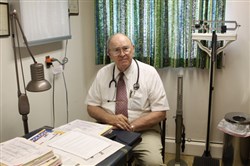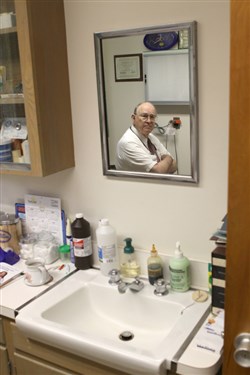VOL. 37 | NO. 38 | Friday, September 20, 2013
‘Obamacare’ a tough pill for 79-year-old Franklin doctor
By Tim Ghianni

“Look at this paperwork,” says Dr. Joe (Joseph Leeper Willoughby) 79, scanning the piled-high examining table at his downtown Franklin Family Practice and Diagnostics “office,” where he’s practiced at since 1961.
-- Michelle Morrow | Nashville LedgerFRANKLIN – “Dr. Joe,” as he’s known to loyal patients – some of whom trade produce for copays – doesn’t plan to let Obamacare ruin his practice.
Beloved Franklin family practitioner Dr. Joseph Leeper Willoughby, who has been operating in the same low-slung white brick building on West Main Street for more than a half-century, turns 80 next month and teases the possibility of retirement.
“I’m not saying anything,” he says, eyes twinkling from behind his spectacles. “My wife says I wouldn’t have anything to do. But I have plenty of things to do.” He rattles off the list of businesses, farms and real estate he oversees.
Dr. Joe leans back in a chair in the examining room that serves as an office, the table stacked high with charts and files. “The people I’m dealing with are good folks,” says the recent recipient of “a sack full of zucchini and two cantaloupes” in lieu of cash from a patient. “A lot of our older people have a pretty good-sized garden.”
Noting fresh produce helps keep those elderly people fed and healthy, he adds that when he first began practice across the street from the old Franklin Hospital 52 years ago, a dozen eggs was not an uncommon payment method.
“It’s mostly older people, Medicare patients,” he says of the clientele that keeps him coming to the office from 8-12:30 a.m. Mondays-Thursdays.
“That’s just the way the world is. I’ve gotten older, they’ve gotten older. I take a few new patients, but not many.”
His love for these patients and this practice has kept him from firming up any sort of exit strategy as his 80th birthday nears next month.
“I can’t get anybody else to look after my patients. Young doctors will not look after geriatric patients, because they (doctors) will not be able to pay rent.”
Dr. Joe’s feelings about how Medicare has affected his profession have a bearing on how he regards Obamacare.
“I don’t know of a single government program that’s good,” he says. “Is welfare good? It’s great as long as you’ve got people who pay taxes to let the government fund the program.”
Medicare not only leads to lower pay for physicians, it also binds them with bureaucracy, he says.

"While other doctors play golf to relax, my dad farms,” says son Andy Willoughby, who runs Handy Hardware in Franklin.
-- Michelle Morrow | Nashville Ledger“With Medicare, well there’s so much paperwork that a doctor doesn’t have time to treat a patient,” he says, noting that a new Medicare coding program coming next month will necessitate that doctors “fill out three times as many forms than we fill out now.”
Again, with a tease that retirement may loom, he says that the new coding program may not affect him. But he doesn’t expand on that.
Obviously, there’s no doubt he much prefers his roots in “saddlebag medicine” to what he sees as a nightmarish future for his profession.
Obamacare “is going to destroy medical care,” he says. “The government is not going to pay for it. If you have a heart attack, you do like you do in England: You treat it at home.
“The government is broke. You have to realize the government doesn’t have any money. That means you are going to have healthcare that doesn’t exist. I’m not sure that before Congress adjourns they may not obliterate Obamacare. Nobody likes it.”
Melancholy anger flavors his voice. “I’m not sure that health care as you and I know it will ever exist under Obamacare.”
Dr. Joe wouldn’t have had to worry about such matters if he had stuck with his original career plans.
“My father was in the farming business, A.H. Willoughby,” he says, noting that his youth included milking cows and other agricultural chores out in what was then a lightly populated swath of Wilson County called Mt. Juliet.
So it seemed natural for him to plan a future as a veterinarian, tending the medical needs of horses and cows.
Those plans changed when “I was convinced by a doctor in Lebanon, Tennessee” to go to medical school.
Still, what he thought he liked about veterinary medicine – the regular “saddlebag” routine of taking medical equipment and visiting patients where they live – is what he ended up liking most about his early start as a general practitioner.
“With house calls, you got to know your patients, and you knew the whole family and it was family medicine,” he says. “I can’t remember when I stopped (house calls). It’s been a long time.”
The bustle of modern-day Franklin – surrounding his office in the brick building with the blue “Family Practice and Diagnostics” sign and a giant magnolia out front – is far different from the relatively pastoral life of a family practitioner he bargained for after getting out of the Navy in 1960.
“I went into the Navy during my junior year when I was in medical school at UT-Memphis,” he says. “Memphis had a naval reservation, and all the older naval doctors had talked all the younger doctors to join.”
He said the young doctors joined the reserve and stayed in school, going on active duty when their educations ended.
“I left school and went to Jacksonville, Florida, where I interned at the U.S. Naval Hospital,” he says.
His next medical work came on the USS Tanner, which traveled the Persian Gulf and the Indian Ocean. “The whole thing was a big adventure. I was over there for a year. I was in Iran, Pakistan, India.”
Departing active duty, he worked at the Naval Air Station in Memphis, before looking for a place where he and his high school sweetheart – he and Betty Jo, aka “Miss Betty,” have been married 56 years – could raise a family.
They found their spot after being heavily recruited by Franklin resident Dr. R.H. Hutcheson Sr., the state health commissioner and father of one of Doctor Joe’s med school classmates.
“I came here in December 1960,” Dr. Joe says. “At the time there were six doctors in town. I did obstetrics, family practice, minor surgery, emergency room work: accidents, injuries … all that sort of thing.”
His son, Andy Willoughby, who runs Handy Hardware (in a building the doctor owns) in downtown Franklin, has fond memories of the early days of his father’s practice.
“Back then, he made rounds at the nursing home, at the hospital. I can remember vividly going with him to these nursing homes and going to check on a patient,” the younger Willoughby says, obvious pride in his voice as he talks about his dad’s great bedside manner and demeanor. “He’s a very fair man.”
Back then, a big part of any doctor’s work was not in the office but on the road, toting a little black bag to the bedsides of sick patients.
“There wasn’t anything wrong with that, except it was time-consuming. You don’t have any lab work and you had to take your own electro-cardiogram,” Dr. Joe says of what he calls “saddlebag medicine.”
In those house call years, he was carrying on a family tradition. His grandfather, Dr. E.V. Pennington, “was a practitioner in Mohawk, Tennessee, up in Greene County (in upper East Tennessee).
“I never knew him,” says Dr. Joe. “He was dead before I came along.”
Yet the country doctor had a profound influence on his grandson.
“When I got out of the Navy and came here, I decided to write a history of my grandfather, and that’s what I did,” he says. “I had to go to Hamblen County and talk to all the pharmacists that were still in existence, and I got his prescriptions from their libraries.”
Those prescriptions and anecdotes he collected on his exploration of his medical roots were collected for posterity.
“I wrote a paper called ‘Saddlebag Medicine’ that described what he did. He used a horse and buggy to do his house calls.”
Roots in general are important to Dr. Joe. In addition to the history of his grandfather’s horse-drawn medical practice, he also keeps his own youth alive on the more than 1,300 acres of farmland he owns, including a 1,009-acre spread in the Maury County community of Theta.
“While other doctors play golf to relax, my dad farms,” says son Andy Willoughby.
The doctor agrees. “I grew up on a farm,” he says. For a long time, he relaxed by doing “whatever needed to be done. I used to feed a lot of beef cattle and put up silage. As you get older, you slow down, you lease the land and you sell hay.”
One thing he continues to relish is the time spent baling hay, and he laments that frequent recent thunderstorms have cut short his time in his beloved fields lately.
The good doctor won’t comment any further about when his mornings will be freed up to allow him full days in the hayfields and hollows of a gentleman farmer’s existence.
“My practice has been good for me and still is,” Dr. Joe says. “I saw a patient yesterday that I’ve been seeing for 41 years.”